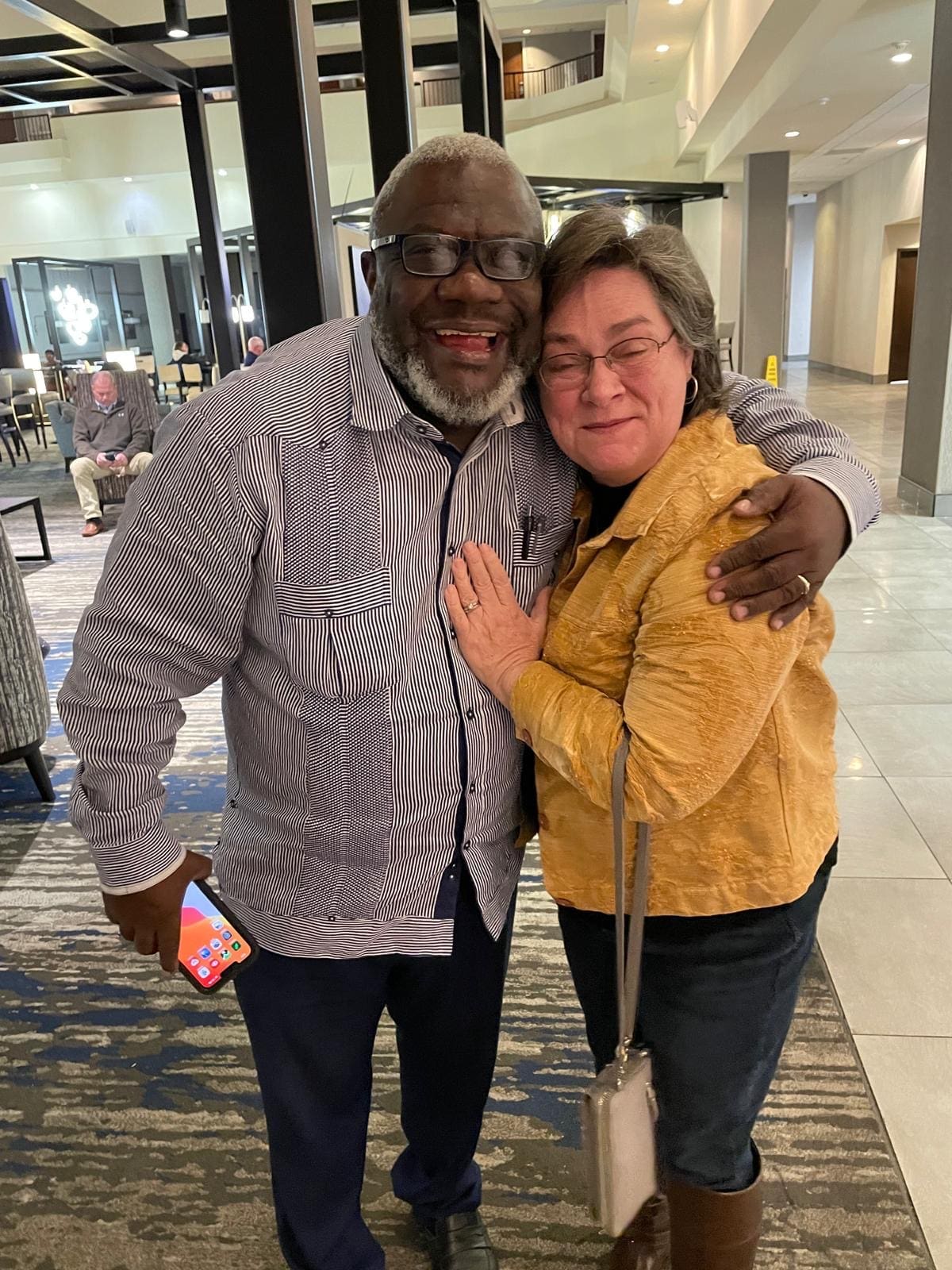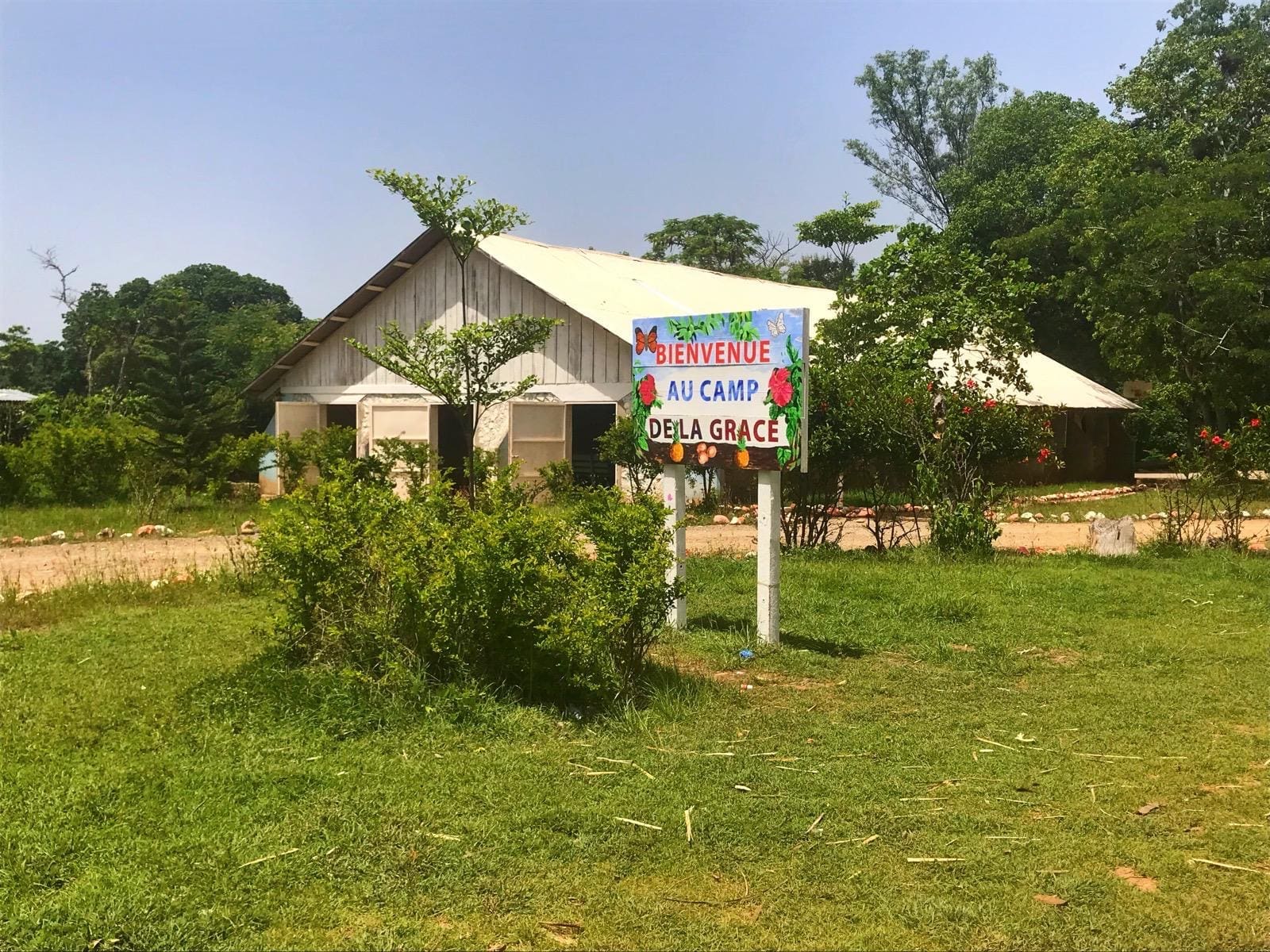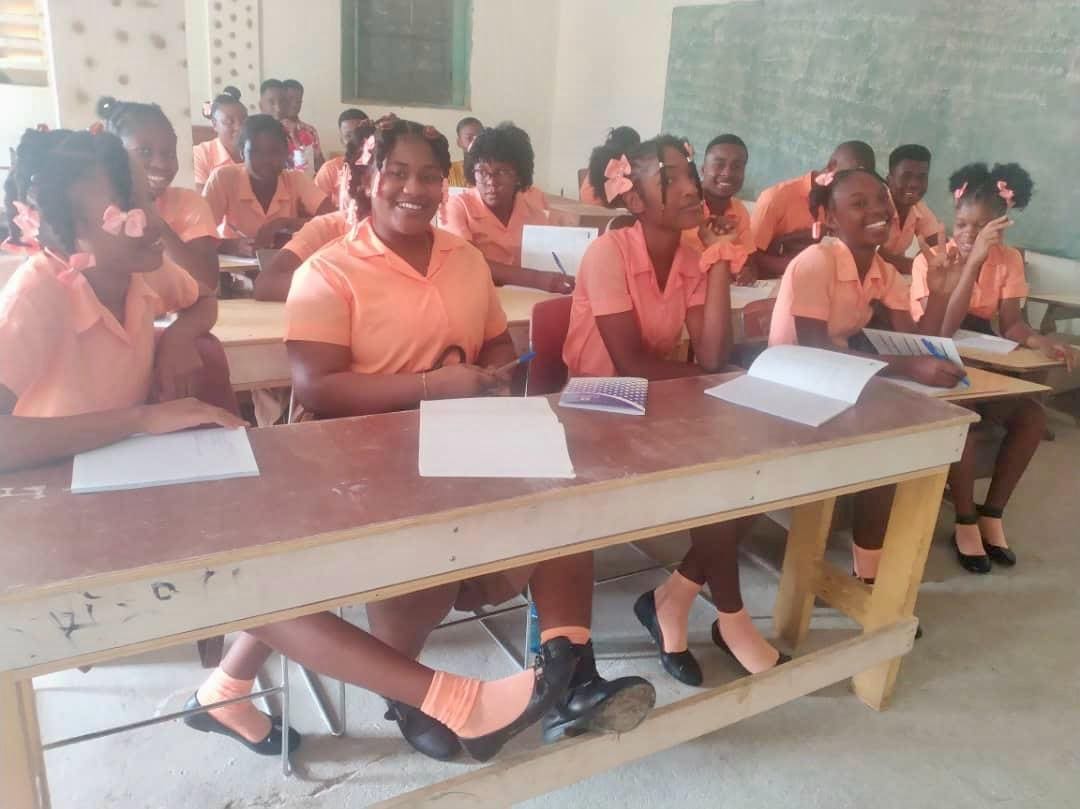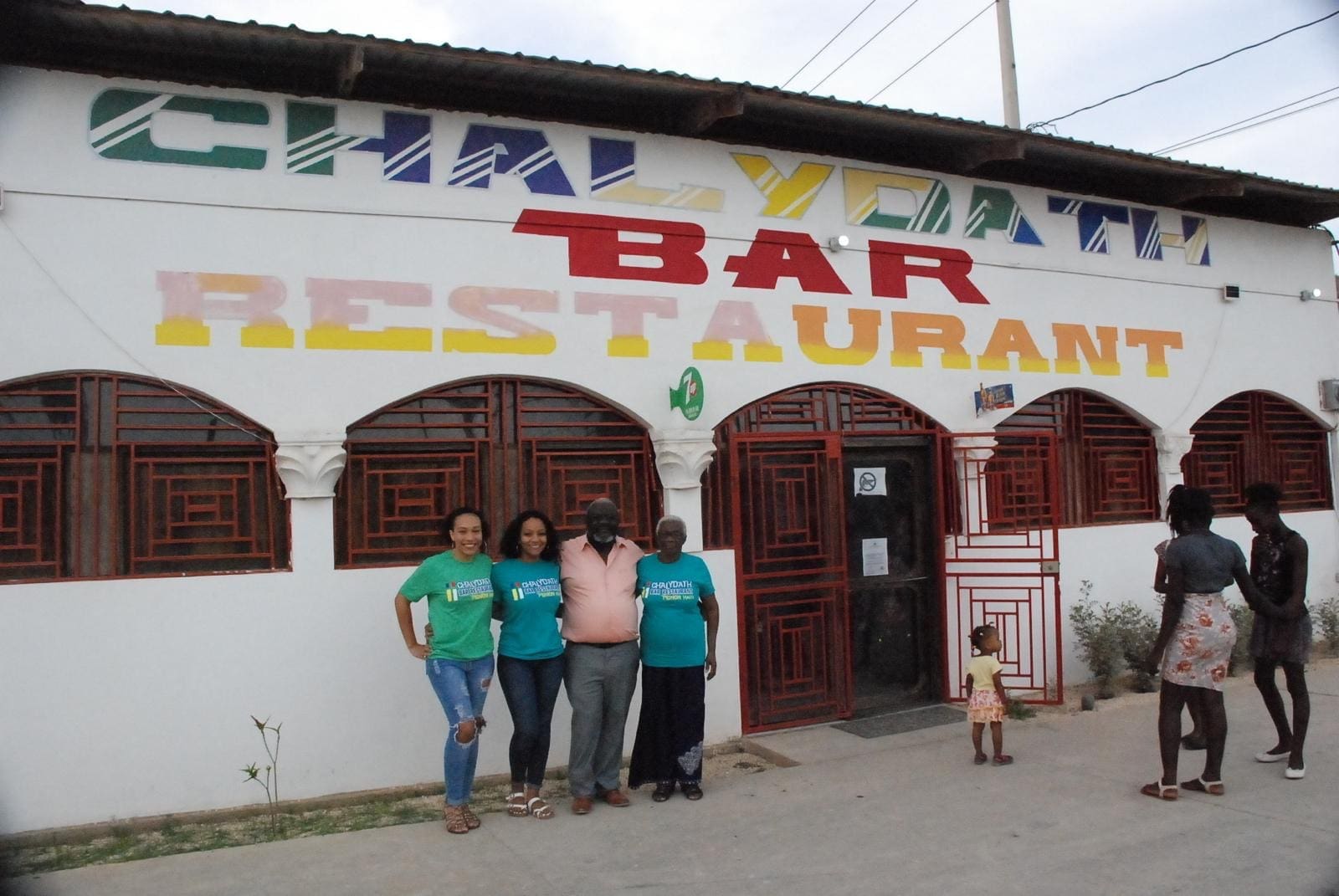“I’m a dreamer,” Caleb Lucien says, “As a matter of fact, my motto is, ‘it does not cost anything to dream. If you are dreaming, dream big.’ Over the past 40 years, I’ve dreamed a lot for the Lord, for my personal life, and for Haiti. And there is one thing I’ve learned: when the Lord wants it, He’s going to provide.”
Caleb Lucien is from Pignon, Haiti, about two hours north of the capital, Port-au-Prince. He is one of nine children and the son of a pastor. He attended Washington Bible College in Maryland in the 80s to get a Bachelor of Arts in Christian Education, and would also go on to Dallas Theological Seminary (DTS) to earn a Master of Theology and a Master of Arts in Christian Education. “My goal and vision was always to return to Haiti.”
Toward this end, he sought sponsorship from mission organizations to send him back as a national missionary. All but one told him no, and the one that said yes had a condition: he would have to serve in Argentina for three years before going back to Haiti. At this news, he became frustrated. He knew he needed to be in Haiti. Seeking advice, he contacted some of his friends.
“They said, ‘you have a vision. You have goals. You have a place for ministry. Why don’t you start something?’ And that’s how, in May 1984, we get Hosean International Ministry, Inc., with the goal of empowering Haitians with the gospel of Jesus Christ through life skills training, education, business and economic development, and whatever else the Lord would lay on our hearts.”
Caleb took inspiration for the name from the book of Hosea in the Old Testament, which means “salvation” or “help.” Haiti’s past and present has been fraught with struggle and suffering, thus Caleb determined Hosean would be fitting — and hopeful.
Fellowship’s involvement with Hosean dates back to the very beginning. The same year that Caleb was about to go to DTS, a professor there who’d heard about Caleb brought some seminary students to Pignon to meet him. Providentially, one of Fellowship’s founding Teaching Pastors, Bill Parkinson (who also graduated from DTS), was there at the same time on a mission trip. The professor and Bill happened to spot each other at a market, and the professor introduced Bill to Caleb. The two have been friends — and their organizations, partners — ever since.
Speaking of partnerships, Caleb’s most important one — his marriage to wife Debbie — began in 1993. A few years prior, in 1989, Debbie was working at UAMS as the Assistant Head Nurse Manager in their surgical oncology unit and was also very involved in volunteering at Fellowship. She says she had “really been challenged by [the] teaching at church encouraging believers to really step out in faith and see how they could serve.” This also produced a desire in her to go on a mission trip. The following year, she went on a weeklong medical mission trip to Haiti and met a certain young man who hosted her group for the week. At the end of her time there, she asked Caleb how she could be praying for him. He said he wanted to be married. So, she started praying for a wife for Caleb. Little did she know — she was praying for herself!

Caleb visited Little Rock in the fall of that year and spent time with Debbie both in a group setting, and one-on-one. It was during that visit that he asked her to accompany him at a friend’s upcoming wedding. Fittingly, at that wedding they discussed their relationship and what moving forward would look like. They dated for two years, seeing one another every couple of months, and talking on the phone weekly. They got engaged in 1992, and of course, married in 1993. They share two daughters, Charissa and Lydia.
The couple has worked side by side to spread the gospel through their work with Hosean for over 30 years. Caleb’s primary investment has been in the area of education and youth outreach, as well as business and economic development. Below are each of the branches of Hosean, along with some fast facts about them:
- Camp de la Grace | Started in 1991 | Six conferences yearly (youth camps, kids camps, pastors’ training conferences, women’s conferences, etc.) | 1,500 people come through Camp de la Grace yearly
- Lapila Christian School | Started in 1991 | K–6 | 168 students
- Child sponsorships | Started in 1992 | 380 children currently being sponsored | 1,550 children sponsored or assisted since its inception | There are currently 50 children on the sponsorship waitlist
- Leglise Evangelique Libre du Cap Haitien | Started in 1992 | 800 congregants/attendees
- College de la Grace | Started in 1993 | K–13 | 800 students
- 4VEP Radio Station | Started c. 2000 | Rebroadcasts programming from an evangelical radio station in Cap Haitien | Broadcasting to about 800,000
- College Susan Scheunke (in Cap Haitien) | Started in 2002 | K–13 | 1,000 students
- Chalydath Bar & Restaurant | Opened in 2016
- Capital Gas Station | Opened in 2019 | 65 employees between the gas station and restaurant
- Disaster Relief Warehouse | In Progress | The goal for the warehouse is to be able to distribute food, bedding, equipment, etc., within 24 hours of a natural disaster occurrence in Haiti (or for other urgent needs)
- Full-time employees across all arms of Hosean: 180
The gas station and restaurant were strategic endeavors for the long-term future of Hosean. “They are businesses that we established so that the ministry would continue to have support,” Caleb explains. “And if you see the trend in terms of support for nonprofits or mission organizations, it’s declining tremendously. It’s not at the pace that it used to be in the past… and so that’s the value of establishing businesses that can support the local economy but at the same time sustain the ministry. And it’s been very effective and very successful.”
Through all the various outreach efforts of Hosean, Caleb and his team demonstrate their understanding of James 2:15–16 (ESV): “If a brother or sister is poorly clothed and lacking in daily food, and one of you says to them, ‘Go in peace, be warmed and filled,’ without giving them the things needed for the body, what good is that?” Indeed, Caleb says, “food is not the only answer, but when people are hungry, and even if you were so convincing with the Word, they’re not going to listen, and so we take a very holistic approach to ministry. I know we do a lot of education, we do a lot of feeding, but our priority is to see people coming into the Kingdom.”
It’s hard to overstate the impact Hosean has had on northern Haiti. “I mean, in our community today, now we have a middle class that didn’t exist before,” Debbie says. Caleb adds that as opposed to 30 years ago, when there were 0 secondary schools in Pignon, “today, we have 15 secondary schools in our community. All of them that have been started by a former student.” (It’s also important to note that none of these developments reported by the Luciens are spoken in a self-congratulatory manner, but rather a God-congratulatory one.)
Beyond the donors, sponsors, and businesses, Caleb says it’s quite clear what has ultimately sustained Hosean for four decades. “The first thing I would say is the faithfulness of God. With everything that has been going [on] in Haiti, it is very rare that an organization started by a national, for nationals, has been able to sustain itself for that long. And it is nothing that I personally have done, but God Himself. The second thing is, when you are in ministry, and especially in the nonprofit world, people want to see if you are going to keep your word in terms of the support they have sent in, and how you said you were going to use it, and how it has been used. If we receive funds to give to a child, those funds go to the child. If we receive funds for a vehicle, it goes for the vehicle. If it is received to build a building, it goes for the building. And that need[s] to be the sponsor and organization relationship.”
Not just Hosean — God’s faithfulness has provided for the Lucien family in massive ways. Debbie recounts two separate times their family was staring down the barrel of colossal medical bills, and how God stepped in in both situations. The first was after the birth of their second child, Lydia. After God had already miraculously sustained Debbie’s pregnancy while she was battling malaria, Lydia had to be hospitalized at two months old for a separate medical issue. The bill ended up being $30,000. They were strategizing how to pay it off and were thinking it’d probably be best if they left Haiti so that Caleb could get a full-time job in the states. But God! The insurance company, which was not faith-based, took a look at their situation and believed the hospital to be overcharging them. So, they waived the bill. The entire thing. All they asked for in return? A photo of Lydia. “They said that would be an encouragement,” Debbie says.
As if that wasn’t enough, years later they would find themselves in a similar situation — with an even steeper bill. In 2020, Caleb’s older brother Henoc passed away suddenly due to Covid. Caleb’s grief took the form of him laying on the couch for five days, refusing any food or water. This sent him to the ICU for eight days. For that, they owed $100,000. They were bracing themselves to be paying that for the rest of their lives. However, in what was now becoming a bit of a trend for the Luciens, the clinic wrote off that bill in its entirety as well. Debbie says she was thinking to herself, “I could get used to this!”
As miraculous as both of these situations were, there was one radically life-altering example of the Lord’s provision for the Luciens that dates all the way back to 1967, when Caleb was just seven years hold, and quite literally made Hosean even possible. Caleb’s father was taking his older brother and sister to school in the northern coastal city of Cap-Haitien, but he could not take Caleb, as their family couldn’t afford it. By God’s grace, the principal asked Caleb’s father if he had any other school-aged children. He said yes, but explained the situation. The principal replied, “bring him to school; as long as he’s willing to study, we’ll look for a sponsor for him. He will not have to pay anything.”
Find one they did, and that individual sponsored Caleb’s education for the next 15 years. Caleb was and is endlessly grateful. Of sponsored children in Haiti, Debbie says, “If they know someone is investing in them, a lot of things change.” Caleb tried locating his sponsor for many years, with no luck. In yet another example of God’s immense kindness, though, a few years ago one of the daughters of the sponsor reached out to Caleb on Facebook, asking him if he was that same boy from years ago whom their father had supported. He replied in the affirmative, to which she said, “we’ve been praying for you, my dad always told us that we have a brother in Haiti!” Caleb got the extraordinary opportunity to meet two of the man’s four children just a few years ago. Sadly, their father had passed away, so Caleb never got to meet him. But getting to know the daughters, whom he refers to as his sisters, has been an absolute gift.

Reflecting on his own sponsorship story and the ripple effect that our actions can have, Caleb says, “I think when we get to eternity, we’re going to see so many people that even though we don’t know them, we never met them, that God has used so many of us to impact lives and to make a difference, and all of it is for the Kingdom.”
That’s the key to ministry and missions for Caleb and Debbie: obedience to God, for the glory of God and for His Kingdom. As Caleb puts it, “Missions is not location, it is obedience to God.” He also says there’s a specific sequence that needs to happen to prepare one’s heart for missions: “if you want to get involved in ministry and in missions as a whole, start serving at home. Because I don’t see how you’re going to develop love for people, or a group of people that you don’t even know, when you can’t serve right here at home. That’s number one. Number two: don’t confine God to your little world. God is a global God. And He’s working all over the world. See where you fit in, in His plan. And missions is not an option, it’s an obligation.” The same goes for prayer. “You don’t pray for things you don’t care about,” Caleb says. “You may pray vaguely, but you pray with greater passion for those you know and you come to love.”
Regarding succession and the future of Hosean, Caleb says, “it’s not really up to me to know or to decide who is going to be the next leader of Hosean. My responsibility is to invest into the lives of people, into the lives of young people, who would catch the vision, and who would feel called by God to go to Haiti and be the leader that God wants him to be.”
To learn more about Hosean, donate, or get involved, click here.



